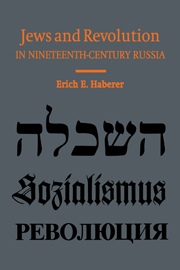Book contents
- Frontmatter
- Contents
- Preface
- 1 Introduction: The beginnings of Russian–Jewish radicalism, 1790–1868
- Part 1 The Chaikovskii circles: Jewish radicals in the formative stage of revolutionary Populism, 1868–1875
- 2 Jewish student activists in St Petersburg
- 3 Chaikovskyist Jews in Moscow, Odessa, and Kiev
- 4 The rebellious Jewish youth of Vilna
- 5 Socialist Jews and Russian Populism
- Part 2 The Land and Freedom Party: Jews and the politicization of revolutionary Populism, 1875–1879
- Part 3 The Party of the People's Will: Jewish terrorists of socialist conviction, 1879–1887
- Appendix
- Abbreviations
- Notes
- Bibliography
- Index
5 - Socialist Jews and Russian Populism
Published online by Cambridge University Press: 22 January 2010
- Frontmatter
- Contents
- Preface
- 1 Introduction: The beginnings of Russian–Jewish radicalism, 1790–1868
- Part 1 The Chaikovskii circles: Jewish radicals in the formative stage of revolutionary Populism, 1868–1875
- 2 Jewish student activists in St Petersburg
- 3 Chaikovskyist Jews in Moscow, Odessa, and Kiev
- 4 The rebellious Jewish youth of Vilna
- 5 Socialist Jews and Russian Populism
- Part 2 The Land and Freedom Party: Jews and the politicization of revolutionary Populism, 1875–1879
- Part 3 The Party of the People's Will: Jewish terrorists of socialist conviction, 1879–1887
- Appendix
- Abbreviations
- Notes
- Bibliography
- Index
Summary
Taking stock of the role of Jews in the Russian revolutionary movement of the first half of the 1870s, it is apparent that Jewish radicals made up a significant component of Populist circles both quantitatively and qualitatively. Contrary to the notion that Jewish Populists were a minuscule quantity, we find that their rate of participation in the movement approached 7 per cent in 1875–76, signifying a doubling of their ratio since 1869–70. The take-off point for this increase occurred in 1871–72. These years signalized the first sharp rise in Jewish revolutionary involvement that had begun auspiciously with Natanson's, Goldenberg's, and Chudnovskii's participation in the St Petersburg student unrest of 1868–69. But as these names suggest, overall numbers and percentages tell us little about the actual role and influence of Jews in the formative period of Russian revolutionary Populism.
It is in the make-up and activity of the Chaikovskii circles – the most important organized congregation of Russian revolutionaries in 1871–74 – that we find a more reliable index of the role played by Jews. Here their membership was far in excess of what was warranted by their general presence in the movement at that time, which until 1874 was roughly proportionate to the percentage of Jews in the general population of Russia. Jews comprised a staggering 20 per cent of all Chaikovtsy (that is, 22 out of 106 persons) who were definitely members or close associates of the organization in St Petersburg, Moscow, Odessa, and Kiev.
- Type
- Chapter
- Information
- Jews and Revolution in Nineteenth-Century Russia , pp. 94 - 116Publisher: Cambridge University PressPrint publication year: 1995



